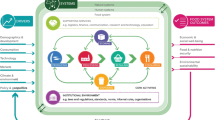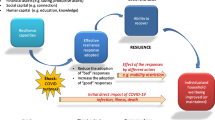Abstract
The idea of food sovereignty has its roots primarily in the response of small producers in developing countries to decreasing levels of control over land, production practices, and food access. While the concerns of urban Chicagoans struggling with low food access may seem far from these issues, the authors believe that the ideas associated with food sovereignty will lead to the construction of solutions to what is often called the “food desert” issue that serve and empower communities in ways that less democratic solutions do not. In Chicago and elsewhere, residents and activists often see and experience racial and economic inequalities through the variety of stores and other food access sites available in their community. The connections between food access, respect, and activism are first considered through a set of statements of Chicagoans living in food access poor areas. We will then discuss these connections through the work and philosophy of activists in Chicago centered in food sovereignty and food justice. Particular focus will be placed on Growing Power, an urban food production, distribution, and learning organization working primarily in Milwaukee and Chicago, and Healthy South Chicago, a community coalition focused on health issues in a working class area of the city.
Similar content being viewed by others
References
Alinsky, S.D. 1971. Rules for radicals: New York: Random House.
Alinsky, S.D. 1969. Reveille for radicals. New York: Random House.
Alkon, A.H. 2008. From value to values: Sustainable consumption at farmers markets. Agriculture and Human Values 25(4): 487–498.
Allen, P. 2010. Realizing justice in local food systems. Cambridge Journal of Regions, Economies, and Society 3: 295–308.
Allen, P., and A.B. Wilson. 2008. Agrifood inequalities: Globalization and localization. Development 51(4): 534–540.
Allen, W. 2009. Good food manifesto for America. https://www.growingfoodandjustice.org/uploads/Will_20Allen_27s_20Good_20Food_20Manifesto-1.pdf.
Anderson, M.D. 2008. Rights-based food systems and the goals of food systems reform. Agriculture and Human Values 25(4): 593–608.
Block, D., M. Thompson, J. Euken, T. Liquori, F. Fear, and S. Baldwin. 2008a. “Value webs” for local food system development. Agriculture and Human Values 25(3): 379–388.
Block, D., N. Chavez, and J. Birgen. 2008. Finding food in Chicago and the suburbs: The report of the northeastern Illinois community food security assessment. http://www.csu.edu/nac/documents/reporttothepublic060308.pdf . Accessed 13 Aug 2009.
Block, D. and W. Peterman W. 2006. Community development and Chicago. In Chicago’s geographies: Metropolis for the 21st century, eds. R.P. Greene, M.J. Bouman, and D. Grammenos, 143–150. Washington, DC: Association of American Geographers.
Block, D., J. Hooberman, D. Moore, R. Noty, L. Redmond, and E. Salem. 2005. The challenge to an apple a day: The availability of fresh produce in Chicago communities. Chicago: Chicago Department of Public Health with the Chicago Food Systems Collaborative and the Northeastern Illinois Community Food Security Assessment.
Bocskay, K.A., D.M. Harper-Jemison, K.P. Gibbs, K. Weaver, and S.D. Thomas. 2007a. Community area health inventory part one: Demographic and health profiles. Health status index series, vol. XVI (V). Chicago, IL: Chicago Department of Public Health Office of Epidemiology.
Bocskay, K.A., D.M. Harper-Jemison, K.P. Gibbs, K. Weaver, and K.S.D. Thomas. 2007b. Community area health inventory part two: Community area comparisons. Health status index series, vol. XVI (V). Chicago, IL: Chicago Department of Public Health Office of Epidemiology.
Born, B., and M. Purcell. 2006. Avoiding the local trap: Scale and food systems in planning research. Journal of Planning Education and Research 26: 195–207.
Chavez, N., N. Bates, and J. Hebert-Beirne. 2007a. Englewood and west englewood community report: Qualitative interviews. http://www.csu.edu/nac/documents/EnglewoodGroupInterviewReport.pdf . Accessed 13 Aug 2009.
Chavez, N., N. Bates, and J. Hebert-Beirne. 2007b. Riverdale community area, Chicago. Northeastern Illinois community food security needs assessment qualitative interviews. http://www.csu.edu/nac/documents/Riverdalegroupinterviewreport.pdf . Accessed 13 Aug 2009.
Cummins, S., and S. Macintyre. 2002. A systematic study of an urban foodscape: The price and availability of food in greater Glasgow. Urban Studies 39(11): 2115–2130.
Desmarais, A.A. 2007. La Via Campesina: Globalization and the power of peasants. Halifax, Canada: Fernwood Publishing.
Fuller, J. 2005. Minority areas lack fresh produce. Chicago sun times, September 4, p. 10a.
Gallagher, M. 2006. Examining the impact of food deserts on public health in Chicago. Mari Gallagher Research & Consulting Group.
Growing Food and Justice Initiative. 2009. What is GFJI? https://www.growingfoodandjustice.org/. Accessed 13 Aug 2009.
Growing Power 2009. Chicago farms and projects. http://www.growingpower.org/chicago_projects.htm. Accessed 13 Aug 2009.
Guthman, J. 2008a. Bringing good food to others: Investigating the subjects of alternative food practice. Cultural Geographies 15: 431–447.
Guthman, J. 2008b. “If they only knew”: Color blindness and universalism in California alternative food institutions. The Professional Geographer 60(3): 387–397.
Healthy South Chicago 2009. Healthy South Chicago: Working together for a healthier Chicago. http://www.cchsd.org/chicagohealthpartners.org/html/southchicago/southchicago_index.html. Accessed 13 Aug 2009.
Levkoe, C.Z. 2006. Learning democracy through food justice movements. Agriculture and Human Values 23(1): 89–98.
National Training and Information Center. 2009. Our big ideas. http://www.ntic-us.org/index.php?option=com_content&task=view&id=13&Itemid=30. Accessed 13 Aug 2009.
Pimbert, M. 2009. Towards food sovereignty. Gatekeeper 141. London: International Institute for Environment and Development.
Poppendieck, J. 1999. Sweet charity: Emergency food and the end of entitlement. New York: Penguin.
Roberts, W. 2008. The no-nonsense guide to world food. Toronto: New International Publications, Ltd.
Rush, Bobby. 2008. Turning urban deserts into urban oases, TheHill.com, Posted: June 10, 2008. http://thehill.com/op-eds/turning-urban-deserts-into-urban-oases-2008-06-10.html. Accessed 21 July 2009.
Schmich, M. 2009. Lacking fresh food leaves neighborhoods less than whole. Chicago Tribune May 22, 2009, p. 6.
Slocum, R. 2006. Anti-racist practice and the work of community food organizations. Antipode 38: 327–349.
Smith, N. 1984. Uneven development: Nature, capital, and the production of space, 3rd ed. Athens, GA: University of Georgia Press.
The Food Trust. 2001. The need for more supermarkets in Philadelphia. Philadelphia: The Food Trust. Available at http://www.thefoodtrust.org/pdf/supermar.pdf. Accessed 10 Feb 2009.
U.S. Department of Health and Human Services. 2010. Obama administration details healthy fresh food financing initiative. News release, 19 Feb 2010. Available at: http://www.hhs.gov/news/press/2010pres/02/20100219a.html. Accessed 10 Oct 2010.
Williams, O. 2005. Food and justice: The critical link to healthy communities. In Power, justice, and the environment, ed. D.N. Pellow, and R.J. Brulle, 117–130. Cambridge, MA: MIT Press.
Author information
Authors and Affiliations
Corresponding author
Rights and permissions
About this article
Cite this article
Block, D.R., Chávez, N., Allen, E. et al. Food sovereignty, urban food access, and food activism: contemplating the connections through examples from Chicago. Agric Hum Values 29, 203–215 (2012). https://doi.org/10.1007/s10460-011-9336-8
Accepted:
Published:
Issue Date:
DOI: https://doi.org/10.1007/s10460-011-9336-8




